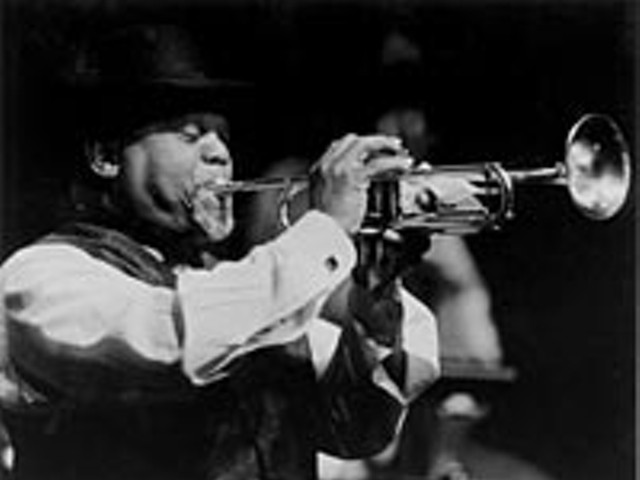Matthew Herbert is a soft-spoken, genre-splitting dance producer whose recent 12-inch, EP and LP releases (as Radio Boy, Doctor Rockit, Wishmountain and Herbert) have created a body of work as creative and challenging — to audiences as well as artists — as anyone working today.
Starting college as a theater major, Herbert soon turned an earlier classical and big-band education into a seven-band keyboard-player workout before finally moving into electronic production after experiencing the promise of acid house in the late ’80s. The movement, which initially hinged on imported house and techno tracks from Chicago, New York and Detroit, provided the sound track for a generation and provided artists such as Herbert a fruitful context for their creativity.
The result was a delving into dance music far beyond the oonce, oonce, oonce. Early Herbert singles used house as the steady structure on which to experiment with spoken and found-sound sampling without giving up the dance floor. Adjacent projects, such as Doctor Rockit, which was the moniker for Herbert’s first EP in 1995, and Wishmountain continued his fusion of ideas and beats.
But after four albums, including 1998’s Around the House and last year’s Dr. Rockit full-length, Indoor Fireworks, Herbert’s new recording, Bodily Functions, has realized current potentials. Like Autechre meeting Cole Porter, Herbert and vocal and romantic partner Dani Siciliano have fused earlier sounds and ideas into a rare realm where art concepts (manifestos, politics) and genres (jazz, IDM), seemingly poison-filled with pretension, are woven into house pop with a soul-searching lyrical vulnerability.
The record puts human relations and creativity at the fore while cementing Herbert’s growing feeling that his career is a “privilege and a luxury” and that that luxury requires that “you owe back.” Herbert states, “You can’t take it for granted. You have to try to do something different and do it most importantly with some integrity. You have to start off from the right point.”
Revolution betrayed
But that integrity was easier to come by in the earlier underground days of the English rave culture and is now far from apparent in England’s multimillion-dollar club scene. Disciplined by Margaret Thatcher and John Major with draconian laws, including statutes against repetitive music and caravans of more than four cars on the highways, the early rave scene knew itself to be a real political movement that had tapped into gay and black America’s sense of bodily liberation and struggle. But this early period did not last and the parties moved (as many American parties have done) into clubs — places, as Herbert insightfully argues, built for private bottom lines not public revolution: “It hasn’t realized — it has forgotten really — that it is a political movement.”
According to Herbert, the failure of the scene’s cultural politics has been paralleled by failures in musical technology and imagination. Once-liberating early drum machines, which failed to do what they were meant to do but instead did whatever young electronic rebels willed them to do, have given way to sample-heavy drum machines and software designed to make the creative process as derivative as possible.
“People’s imaginations have ground to a halt, as they have been distorted by this pursuit of money. Technology has acknowledged that. Now we have boxes where you feed records in and it loops them all up perfectly. There are drum machines with all these defining textures of electronic music that can now be bought in one box.”
The results are technologies that Herbert argues reinforce people’s already warped sense of artistic consumerism where “people think that it’s their right to take whatever they want from music’s back catalog rather than treat it as a possibility or a privilege.”
Making honest mistakes
To keep himself honest, Herbert created his own Personal Contract for the Composition of Music (PCCM) which, among other things, demanded that he rely on his own sound creations as material for his sampler.
“My point is why sample a drum stroke from Elvin Jones when you can do it yourself? You could get a brush and a snare or, even more exciting than that, get a broom and build your own drum.”
Detroiter Theo Parrish is featured on Herbert’s 2000 mix CD, Let’s All Make Mistakes. Parrish’s most recent 12-inch “Segments From the Fifth Wheel” (Moods and Grooves) also uses eccentric samplings of piano riffs to mess up what he calls “the music formally known as house.” Parrish and Herbert, along with other artists, continue to see the relevance between electronic engineering and real life that groundbreaking electronic music — from Kraftwerk to Marshall Jefferson — has always made. Herbert has also understood the connections between technology and violence, citing Philips, the CD-player maker as also an arms manufacturer. But Herbert, like Detroit labels Underground Resistance and 430 West, understands that this same tendency towards violence and materialism leads just as well to spirituality and liberation: “That’s the joy of a sampler: No matter what they do, it’s empty at the end of the day and it’s only as good as what you put into it. If you’re going to fill your sampler up with something, you have a perfect opportunity to fill it with your own stuff.”
Carleton S. Gholz discovers ideas while making them his own. E-mail him at [email protected]




